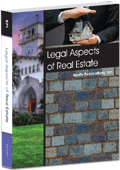Question: When fraud is used to obtain a contract, is the contract considered void or voidable?
Answer: A contract obtained through false representation is voidable. Fraud is a type of misrepresentation, so when fraudulent or negligent misrepresentation is used on a contract, it creates a voidable contract. It requires a court order to be declared invalid.
An unavoidable distinction
Void contracts are unenforceable at all times. Thus, they never convey an interest in real estate. This is referred to as void ab initio — without legal effect from the beginning.
Examples of void contracts include a:
- contract signed and delivered by a seller under the age of 18;
- deed materially altered without the grantor’s consent;
- deed handed directly to the grantee, not a third party, with the intent it is not to be effective until the owner’s death;
- contract in which the consideration is illegal, such as a controlled substance; or
- forged contract.
Consider an owner of real estate who has been judicially determined to be insane and thus deemed incompetent. The court appoints a guardian to manage the owner’s affairs.
A buyer, unaware of the owner’s condition or guardianship, purchases real estate from the owner. The buyer obtains a grant deed to the property from the owner.
Is the deed on the sale of the real estate a valid conveyance since the buyer was unaware of the owner’s condition and paid a fair value for the property?
No! Prior to conveyance, a court found the owner to be incompetent and appointed a guardian to manage their affairs. The court’s appointment of a guardian is considered notice to all of the owner’s condition — whether or not a notice of appointment is recorded — since adjudication of the owner’s incompetence is considered notice.
Thus, the buyer’s status as a bona fide purchaser (BFP) of title from an adjudicated incompetent does not shield the deed from being set aside. The deed was void at its inception and had no legal effect at any time. [Calif. Civil Code §40]
Related article:
Voidable contracts
Void and voidable are similar concepts.
However, they are distinguished by the date they affect the validity of a contract. [See RPI e-book Real Estate Principles, Chapter 48]
While a void contract lacks legal effect at inception, a voidable contract is valid and enforceable after delivery until it is challenged due to a defect and a court order declares the contract to be invalid.
Examples of voidable contracts include a contract obtained through:
- false representation; or
- undue influence or threat.
Unlike void deeds, a voidable deed is enforceable by a BFP or encumbrancer who acquires an interest in the property in reliance on the title held by the grantee under a deed which is voidable but has not yet been challenged as invalid. [See RPI e-book Legal Aspects of Real Estate, Chapter 20]
For example, consider a loan secured by real estate which is in default. The owner is concerned the property might be sold through foreclosure, negatively affecting their credit. A foreclosure consultant approaches the owner and through fraudulent threats and harassment, obtains a grant deed from the owner.
The consultant, as the grantee under the deed, takes possession of the property and refinances it. The new lender is unaware the grantee obtained the grant deed by fraud.
Later, the original owner sues the foreclosure consultant to set aside the deed as voidable.
The grant deed is later declared invalid since the foreclosure consultant used threats and undue influence to fraudulently obtain the deed.
Meanwhile, the new lender whose security interest rests on the voidable deed begins foreclosure under their trust deed.
The owner, having set aside the deed as voidable, claims the lender may not foreclose since the deed on which the lender’s trust deed was acquired has been declared invalid.
May the lender enforce the trust deed created by the grantee under the fraudulent (and voidable) deed which has now been declared invalid?
Yes! The deed was voidable, not void, when it was signed and delivered to the grantee who executed the trust deed now in foreclosure. The lender became an encumbrancer before the defrauded grantor (prior owner) challenged the validity of the deed to the grantee (foreclosure consultant).
Thus, the lender is considered a bona fide encumbrancer, without notice of the defect. Thus, the lender is entitled to enforce the trust deed since it was recorded before the lender had actual or constructive notice of the owner’s challenge which ultimately declared the grant deed invalid. [Fallon v. Triangle Management (1985) 169 CA3d 1103]
Related article:
DRE Hot Seat: Deceitful misrepresentations are not due diligence
Misrepresentation: an umbrella term
We’ve discussed how a contract obtained through false representations is considered voidable. But what about fraud? Isn’t fraud similar to deceitfully forging a contract, and thus, considered void?
No! Fraud is a type of misrepresentation, or the intentional use of deception to induce another person to act against their best interests resulting in the loss of property or money.
Misrepresentation is a false or misleading statement given to another to induce them to do something.
Misrepresentation is an umbrella term. It covers both fraudulent misrepresentation, which is a misrepresentation made with malicious intent and negligent misrepresentation, a misrepresentation made through error.
Thus, all fraud is a misrepresentation.
Although a forged contract might also contain malicious intent, it is unlawful the moment it is created, and therefore, is a void contract.
However, misrepresentation is not unlawful the moment it is created.
Consider an agent misstating the square footage of a building as a negligent misrepresentation. When the agent discovers the misrepresentation, they correct the statement of the square footage. The contract is still valid.
However, when an agent doesn’t correct a misrepresentation on delivery of the contract, the validity of the contract may be challenged through a court decision and the agent may be held accountable for their misrepresentation to the contract participant. [Seeger v. Odell (1941) 18 C2d 409]
Related article:
Have a question for our editorial department? Send us an email at editorial@firsttuesday.us and your question might be answered in the next letter to the editor.
Want to learn more about the delivery, acceptance and validity of contracts? Click an image below to download the RPI books cited in this article.




















